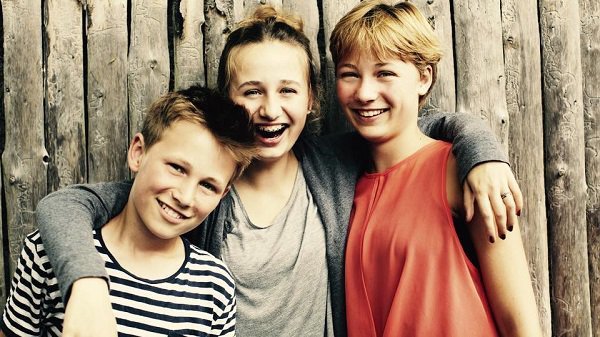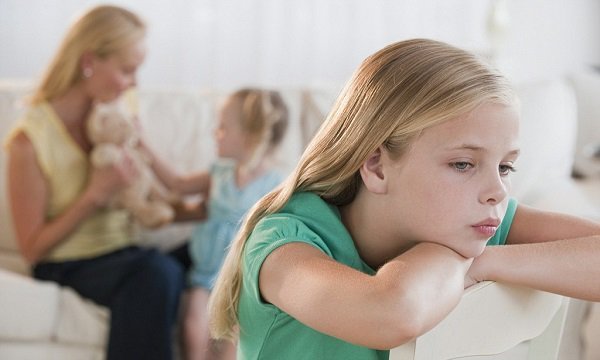“I wish I was an only child.”
This is a thought that every person who grew up with a sibling might relate to. The constant picking over possessions, the mandatory need to share each and every damn thing, the constant battle for your parents love and not to forget the constant comparison between each other; your world is a war-zone when you have a sibling under the same roof.

Over time you realize that regardless of all the irritation and annoyance your siblings are the best gifts that your parents could ever have given to you. You adapt to their presence around the house, and eventually can’t think of life without them.
So, we decided to compile a list of some interesting scientific facts about siblings, and how intricately they’re entwined in each other’s lives.
1. You spend more time with your siblings than anyone else
A Pennsylvania State University study revealed that by the time children turn 11, they spend about 33% of their spare time with their siblings.
In fact, even after they grow up and get busy with their lives, they spend about 11 hours a week with each other, and the duration escalates to 17 hours if the siblings are part of a big family.

2. Fights between siblings are natural
A study has said that siblings who are aged between 3 and 7 years old are involved in fights 3 1/2 times in an hour.
The frequency is even worse with toddlers who reportedly fight every 10 minutes.

3. You are more likely to follow gender rules if you have a sibling of the opposite sex
Research has shown that de-identification is highly prominent between brothers and sisters due to the tendency to carve out an individual personality.
Girls try to adhere to the traditional feminine traits more while their brothers try to be the rough and tough guy that are more prominent in their gender.

4. Siblings help you have better interpersonal skills
Younger siblings look up to their older brothers and sisters, thereby learning how to cope with difficult situations later in their lives.
On the other hand, being a role model to their younger brothers and sisters help the older sibling develop proper nurturing and compassionate skills that the latter wouldn’t otherwise posses.

5. Having an opposite-sex sibling makes you better at getting dates
Studies revealed that those who grew up with siblings of opposite-sex were better at striking and maintaining a conversation at their dates due to the experience of what the opposite-sex likes and dislikes.
Girls who grew up with brothers possessed a certain ruggedness and a tad lack of sincerity in their characters, making them a hit among boys. While boys who had sisters had immense sensitivity and listening skills in them, something that girls absolutely adore.

6. Older siblings are a tad smarter than their younger ones
Studies have shown although younger siblings are born with higher IQ by the time they turn 12, the tables turn around for the firstborns who gain a 3-point IQ advantage over their younger siblings.
Theories have explained that older siblings put a lot of effort to being the perfect example for their younger siblings, and in this process the former strengthen their own understanding of concepts and thoughts.

7. Parents DO have a favourite among their children
Research revealed that 65% of mothers and 70% of fathers show a preference for one child over another.
Although parents clearly deny preferring one child over another the non-favoured sibling actually stays well-aware of this situation. Studies have revealed that while most non-favoured children use this as their advantage, in the long path the truth about being ignored damages their self-esteem and confidence.

8. Siblings can make you skinnier
A Swedish study found that those who grew up with siblings were less likely to become overweight than others who grew up as an only child.
Unlike siblings who share and play with each other a single child stays extra pampered and doesn’t need to worry about sharing anything with anyone increasing the chances of obesity.

9. More siblings mean less likely to divorce as an adult
A study by Ohio State University revealed that each extra sibling (up to 7) cuts down a person’s tendency to split up with their partners in the future by about 2%.
More siblings gives one a better understanding and experience of coping with others, thereby making it easier to deal with marriage in the future.

10. Younger siblings have a tendency to be more rebellious and extroverted
A study on 390 families conducted by the Leiden University in the Netherlands found that younger siblings were much more aggressive and rebellious as opposed to their older siblings.
Younger siblings often feel the need to speak up for themselves and stand up to their older siblings in order to receive attention from their parents, thereby contributing to their extroverted and rebellious nature.

11. Siblings share bad habits with each other
Those siblings who don’t have much age-difference may have a tendency to behave differently as compared to their brothers and sisters.
For example, a younger sibling is twice as likely to smoke and drink if they have an older sibling who already smokes and drinks. Researchers revealed that this arises because younger siblings always try to follow the path of their older siblings while trying to have their own personality as well.

12. Number of siblings and their birth order can impact your health
Research says that younger siblings are less prone to get eczema and other allergies as opposed to their older siblings.
Theories reflect that by the time the younger siblings are born the house is already flooded with germs and allergies that were brought in by their older siblings. This makes the younger children have a better and stronger immune system.

13. Men with older brothers are more likely to prefer a partner of the same sex
Study has shown for every son that a woman gives birth to, the likelihood of the next son being gay goes up by 28% to 48%.
Known as ‘Fraternal Birth-Order Effect,’ researchers revealed that on an estimate up to 1 in 7 men who are gay have more older brothers. However, no such connection has been found in women.

14. Siblings tend to bully each other
A study on 7,000 children aged 12 conducted by the University of Oxford revealed that siblings started experiencing bullying from other siblings as early as the age of 8.
These bullied siblings were twice as much inclined to stay depressed and suffer from anxiety, and even self-harm as compared to other kids.

15. Parental conflicts makes sibling bonding stronger
Siblings count on each other when their parents get divorced or experience parental abuse.
Jeffrey Kluger, author of the book The Sibling Effect: What the Bonds Among Brothers and Sisters Reveal About Us, said that siblings look up to their parents the most, but when they fall apart they hold on to each other because of the fear of losing a unit of themselves.

16. A parents’ death also reinforces the bond among siblings
The loss of parents make the siblings hold on to each other as the last piece of family, and take care of each even more.
Older siblings often are seen to take on the role of a parent when the latter is absent, to teach proper discipline and nurture their younger siblings.

No matter how hard life gets and no matter how many people have turned their backs on you, your siblings will always be by your side.
All gifs sourced from Giphy.

















